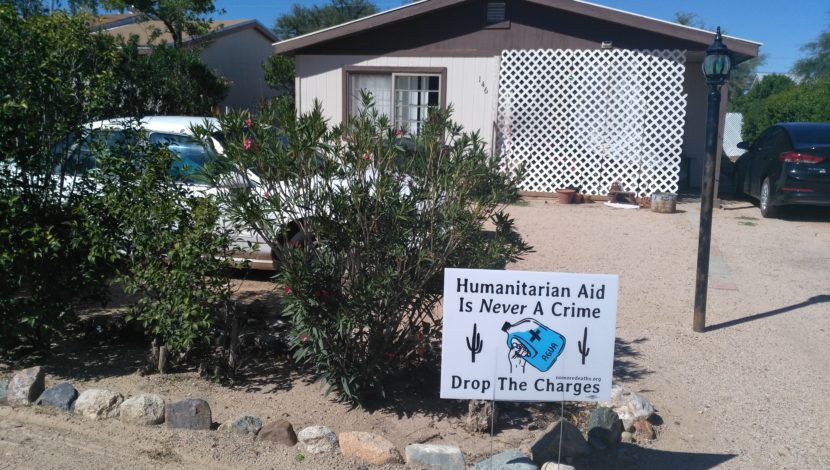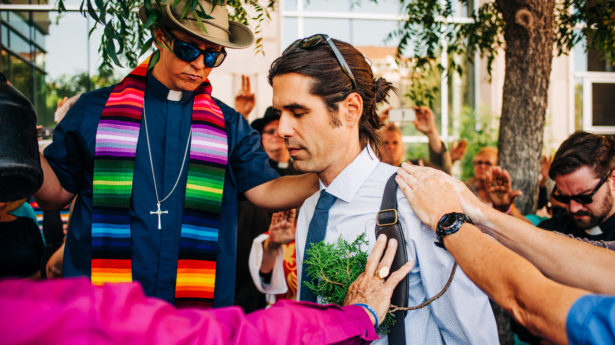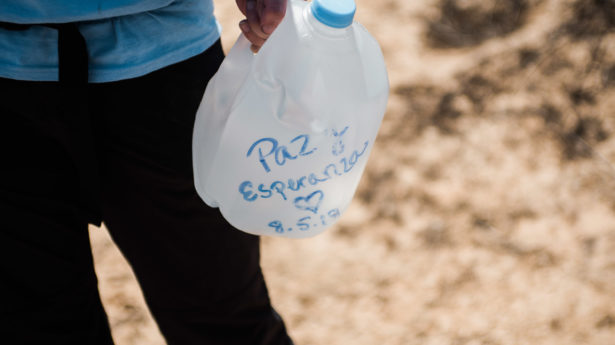The Unitarian Universalist Service Committee advances human rights through grassroots collaborations.
“Agua es Vida” (Water is Life): Reflections on Volunteering with No More Deaths – Part 1

By Rev. Connie Yost on November 15, 2019
Recently, Reverend Connie Yost of the First Unitarian Church, Portland, Oregon, served in a special envoy to raise public awareness around the retrial of No More Deaths activist Scott Warren. This is the account of her experience.
Part 1
“I was hungry and you gave me food, I was thirsty and you gave me something to drink, I was a stranger and you welcomed me, I was naked and you gave me clothing, I was sick and you took care of me, I was in prison and you visited me.” — Matthew 25:35-36
In the gospel of Matthew, these are some of the last words Jesus spoke in public before being arrested, detained and crucified. He is speaking to a crowd which then demands to know, “Lord, when was it that we saw you hungry and gave you food, or thirsty and gave you something to drink?” Jesus replies, “Truly I tell you, just as you did it to one of the least of these who are members of my family, you did it to me.”
With these words in echoing in my heart, I recently had the opportunity to volunteer with the humanitarian aid nonprofit, No More Deaths, whose volunteers leave water, food and other supplies for migrants in the Arizona desert. I was not there to help drop water, though, but was called on to be part of a special envoy of volunteers who were to raise public awareness and support for their work and in particular, the upcoming retrial of a volunteer charged by the federal government on two felony counts of harboring.
The volunteer being tried is Scott Warren, 37, a college professor and volunteer for No More Deaths who lives in Ajo, Arizona. His “crime” occurred when he went to a No More Deaths aid location in Ajo in early 2018 and found two Central American migrants there. He gave them food and water and assessed their medical condition, calling in a volunteer doctor to treat them for dehydration and foot problems. As he was talking with the migrants, border control surveillance filmed him gesturing, which led to a third felony count of conspiracy to transport, which has since been dropped. Scott was tried in June of this year, but the trial ended with a hung jury. His second trial is happening now in Tucson. It is no coincidence that his arrest came just hours after No More Deaths posted a video showing border patrol agents kicking over full jugs of water in the desert.
I worked with a group of young volunteers for two weeks, door knocking, tabling at events, and phone banking, asking residents to put up a yard sign of support, sign up for the e-news and to offer donations and volunteer support for the humanitarian aid effort. For the most part, residents were eager to take signs and were supportive. One woman said, “It’s humanitarian, not political” and eagerly grabbed a sign. Others told us of how “things used to be,” when Tucson was more open and welcoming to all.
In the small town of Benson, east of Tucson, my young partner, Kavi, and I carefully approached a man who was standing on his porch beneath a military flag and next to his vehicle with many military stickers on it. We explained that we were asking residents to take a free yard sign in support of humanitarian aid in the desert. Just then, a woman who might have been his mother came out and said, “You mean for illegals?” My heart sank, but the man said, “Sure, just put it over there.”
There was the occasional pushback. One woman told me that she wouldn’t support people leaving water out in the desert because that just encourages people to come. We were told not to argue with people, just to thank them and leave, which we did. But I wanted to tell her that I was sure that the countless people who have died in the Arizona desert in the last several decades did not risk their life hoping to find a plastic gallon of water in the desert.
In my free time I drove over to Organ Pipe Cactus National Monument, southwest of Tucson and directly south of Ajo. The parking lot of the visitor center was empty except for a border patrol vehicle. Inside, six young border patrol agents were looking at the relief map of the park. I tried to surreptitiously eavesdrop on what they were saying, but I couldn’t hear them and then they went and looked at the exhibits. A man who knew the ranger and seemed to be a local, came in and told the border patrol agents that he was supportive of what they do. “I know a lot of people don’t, but I want you to know that I appreciate you.”
I asked the ranger if they got much foot traffic of migrants through the park. He seemed a little startled by that, and said that I didn’t need to worry because migrants don’t hurt tourists. I explained that I wasn’t worried about my own safety, just curious because I was there with the group who leaves the water out. He said he didn’t know too much about it; someone else on staff dealt more with that. Park signs warned tourists that, “smuggling and illegal immigration may be encountered in this area, call 911. Do not attempt to engage or detain them.” The southernmost section of the monument’s road was closed, “due to construction” the notice said.
I later learned that is where a newly funded border wall is being built.
Photo Credit: Rev. Connie Yost
***
About UUSC: Guided by the belief that all people have inherent worth and dignity, UUSC advances human rights globally by partnering with affected communities who are confronting injustice, mobilizing to challenge oppressive systems, and inspiring and sustaining spiritually grounded activism for justice. We invite you to join us in this journey toward realizing a better future!

